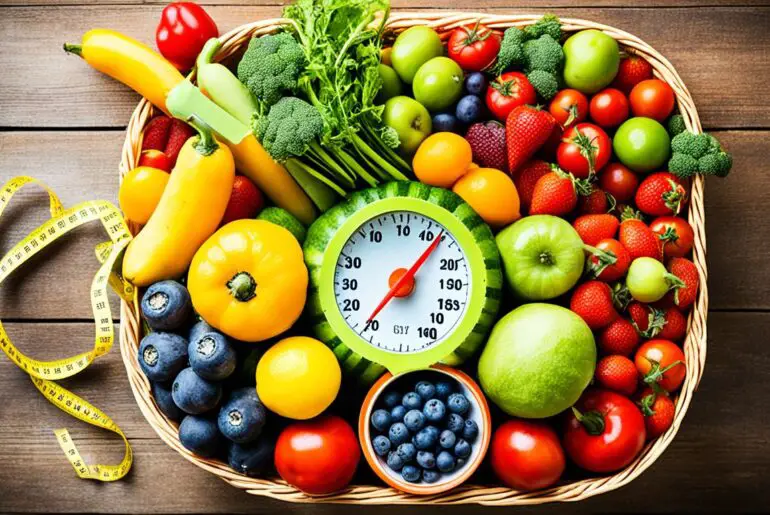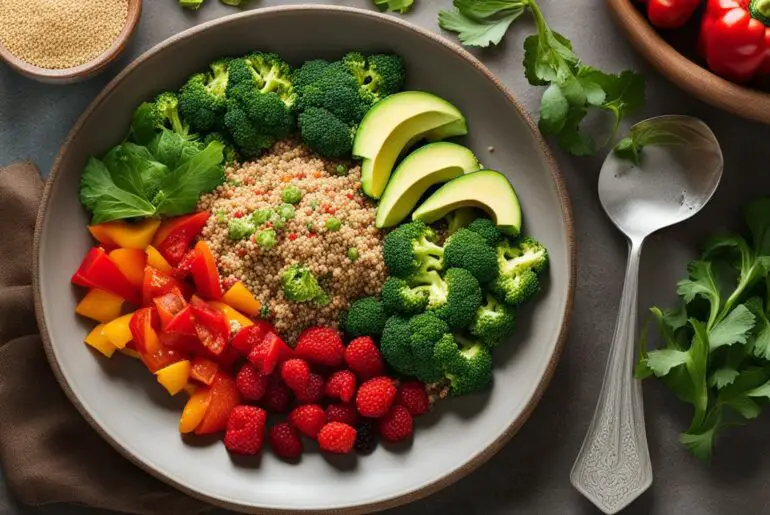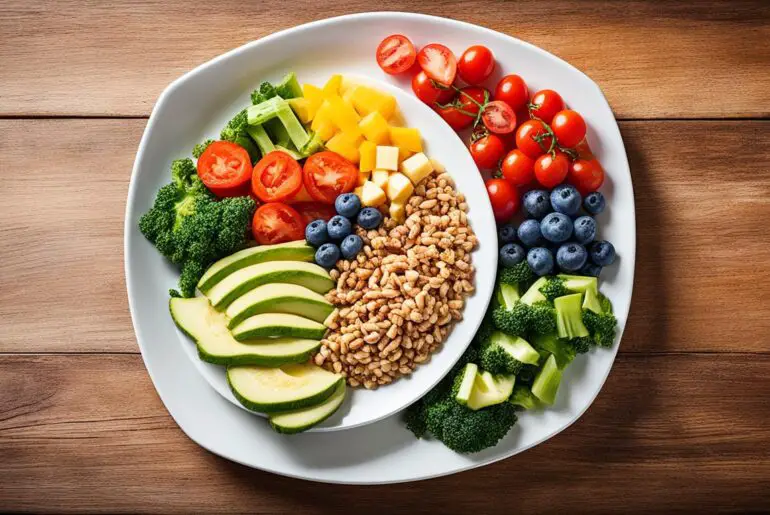Are you looking for a weight loss plan that is suitable for the whole family? Curious about family-friendly HCG diet meal plans that are not only nutritious but also budget-wise? The HCG diet, also known as the human chorionic gonadotropin diet, may offer a solution for busy households seeking healthy meal plans. Contrary to common beliefs, the HCG diet is not just for individuals, but can be adapted to meet the needs of the entire family.
Through proper meal planning and support, you can create an HCG diet meal plan that accommodates the dietary needs and preferences of your family members. This article will explore family-friendly HCG diet meal plans that are not only delicious but also practical for everyday life. Discover how to make the HCG diet a family affair and take a step towards achieving your health and weight management goals together.
Key Takeaways:
- Create family-friendly HCG diet meal plans that are nutritious and budget-wise.
- Involve the whole family in meal preparation and planning.
- Consider alternatives to the HCG diet for safe and effective weight loss.
- Prioritize overall well-being and establish sustainable lifestyle habits.
- Family-focused meal planning can foster healthy eating habits and enjoyable mealtimes.
Understanding the HCG Diet
The HCG diet is based on the concept that HCG hormone supplementation, when combined with a low-calorie diet, can result in rapid weight loss. HCG (human chorionic gonadotropin) is a hormone naturally produced in the body during pregnancy and is believed to help the body burn fat. The diet typically involves daily injections or supplements of HCG hormone while following a strict calorie restriction of around 500 calories per day.
It is important to note that the HCG diet is not without controversy and should only be pursued under medical supervision.
The Three Phases of the HCG Diet

The HCG diet consists of three phases: the loading phase, the weight loss phase, and the maintenance phase. Each phase serves a specific purpose in the overall weight loss journey.
The Loading Phase
The loading phase is the initial phase of the HCG diet and typically lasts for two days. During this phase, individuals are encouraged to consume high-fat and high-calorie foods. The purpose of this phase is to prepare the body for the upcoming calorie restriction in the weight loss phase. By consuming excess calories, the body’s fat stores are replenished, serving as an energy source during the next phase.
The Weight Loss Phase
The weight loss phase is the most important phase of the HCG diet. It involves following a strict 500-calorie per day meal plan while continuing with HCG hormone supplementation. This phase typically lasts between 3 to 6 weeks, depending on individual goals and factors such as starting weight and overall health. The combination of the low-calorie diet and HCG hormone helps to promote rapid weight loss while preserving muscle mass. It is important to closely follow the meal plan and medical guidance during this phase to maximize results and ensure safety.
The Maintenance Phase
The maintenance phase is the final phase of the HCG diet. It is designed to gradually increase calorie intake and reintroduce additional foods while avoiding rapid weight gain. During this phase, the focus shifts from weight loss to weight stabilization and long-term weight management. The duration of the maintenance phase may vary, but it typically lasts for a few weeks. The goal of this phase is to establish healthy eating habits and prevent the regain of lost weight. It is important to continue monitoring food choices and portion sizes even after completing the maintenance phase to maintain the achieved weight loss.
In conclusion, the three phases of the HCG diet, namely the loading phase, weight loss phase, and maintenance phase, work together to promote rapid weight loss, preserve muscle mass, and establish long-term weight management. By following the guidelines and medical advice throughout each phase, individuals can achieve their weight loss goals and improve their overall health.
Maintaining the HCG Diet for Families
Maintaining the HCG diet can be challenging, especially for families. The strict calorie restriction and limited food choices can be difficult to adhere to, especially when cooking for multiple family members with different dietary needs and preferences.
However, with proper meal planning and support, it is possible to make the HCG diet family-friendly. Affordable HCG diet meal plans for families can be created by incorporating cost-effective ingredients, utilizing leftovers, and focusing on nutritious, budget-wise options.
When meal planning for the HCG diet, it’s important to consider the unique challenges that families face. Here are some tips for maintaining the HCG diet while catering to the needs of your entire family:
- Involve the entire family in meal planning and preparation. This not only ensures that everyone’s preferences are taken into account but also fosters a sense of ownership and encourages healthier choices.
- Opt for cost-effective ingredients. Look for affordable sources of lean proteins, such as chicken breast, turkey, and eggs. Incorporate seasonal fruits and vegetables to save money while still providing essential nutrients.
- Make the most of leftovers. Plan meals strategically to maximize the use of ingredients and minimize waste. Leftover roasted chicken, for example, can be used in salads, wraps, or stir-fries the next day.
- Focus on nutritious, budget-friendly options. Look for recipes that are high in protein and fiber, such as grilled chicken with roasted vegetables or vegetable stir-fry with tofu. These options are not only nutritious but also satisfying.
By following these strategies, families can successfully navigate the challenges of the HCG diet while ensuring that everyone enjoys delicious and budget-friendly meals.
Quote:
“Maintaining the HCG diet as a family requires careful planning and a focus on affordable, nutritious options. By involving everyone in the process and making smart choices, families can enjoy the benefits of the HCG diet together.”
Sample HCG Diet Meal Plan for Families:
| Meal | Recipe |
|---|---|
| Breakfast | Spinach and Mushroom Omelette |
| Lunch | Grilled Chicken Salad with Mixed Greens and Vinaigrette |
| Snack | Celery Sticks with Almond Butter |
| Dinner | Grilled Shrimp Skewers with Zucchini Noodles |
| Snack | Apple slices with Cinnamon |
Note: This meal plan incorporates lean proteins, plenty of vegetables, and moderate fruit consumption, adhering to the guidelines of the HCG diet. Feel free to customize it based on your family’s preferences and dietary needs.
Creating HCG-Friendly Meal Plans for Families
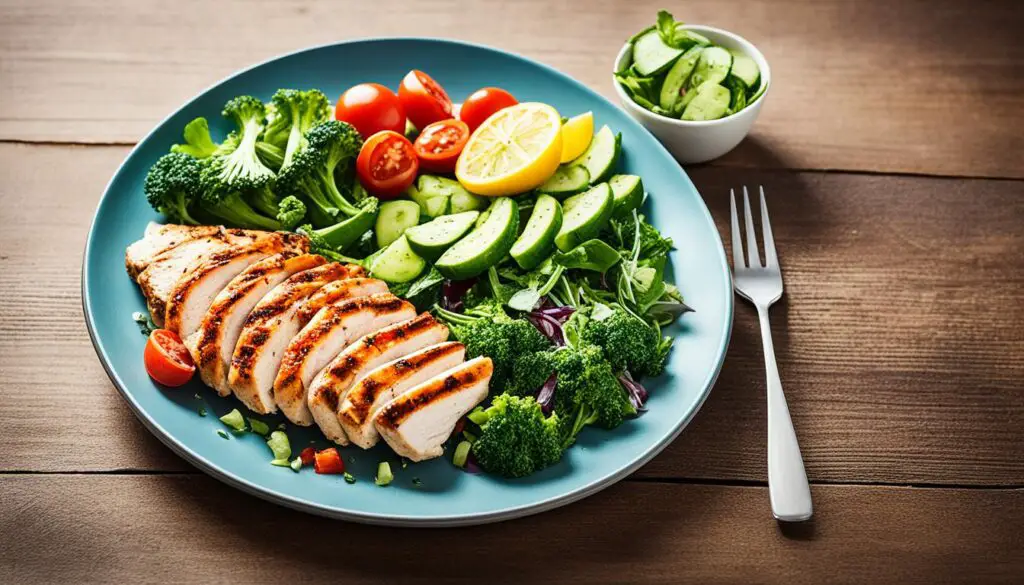
When it comes to creating HCG-friendly meal plans for families, there are a few key factors to keep in mind. These meal plans should focus on incorporating lean proteins, non-starchy vegetables, and limited fruits, while avoiding high-fat foods, added sugars, alcohol, and desserts. Hydration is also crucial, and it’s best to opt for calorie-free beverages like water, coffee, and tea.
To ensure a nutritious and satisfying meal plan, it is essential to have a comprehensive HCG-friendly grocery list. This list should include lean proteins such as lean meat, poultry, and seafood, as well as a variety of non-starchy vegetables like spinach, broccoli, and zucchini. Moderation is key when it comes to incorporating fruits, so include options like berries and citrus fruits in limited quantities.
Let’s take a closer look at a sample HCG-friendly grocery list:
| Lean Proteins | Non-Starchy Vegetables | Fruits | Beverages | Foods to Avoid |
|---|---|---|---|---|
| Chicken breast | Spinach | Berries | Water | High-fat foods |
| Turkey breast | Broccoli | Oranges | Coffee (without sugar) | Added sugars |
| White fish | Zucchini | Apples | Tea (unsweetened) | Alcohol |
By utilizing this grocery list and planning meals around these ingredients, families can ensure that they are following the dietary restrictions of the HCG diet while still enjoying satisfying and nourishing meals together. Incorporating a variety of lean proteins, non-starchy vegetables, and limited fruits will provide essential nutrients while supporting weight loss goals.
“Creating HCG-friendly meal plans for families involves focus on lean proteins, vegetables, and moderate fruit intake, while avoiding high-fat foods, added sugars, alcohol, and desserts.”
Remember, proper meal planning is essential for success on the HCG diet, and involving the whole family in the process can make it a more enjoyable and sustainable experience. With careful consideration of the grocery list and adherence to the dietary guidelines, families can achieve their health and weight management goals while fostering a positive relationship with food and a healthier lifestyle.
Sample HCG Diet Meal Plans for Families
To provide ideas for HCG diet meal planning for families, here are some sample meal plans for each phase of the diet. These meal plans can be customized according to individual preferences and nutritional needs.
Loading Phase Meals
The loading phase of the HCG diet involves consuming high-fat and high-calorie foods to prepare the body for the upcoming calorie restriction. Here is a sample meal plan for the loading phase:
| Meal | Menu |
|---|---|
| Breakfast | Two scrambled eggs with cheese, bacon, and avocado |
| Lunch | Cheeseburger with lettuce, tomato, and mayonnaise |
| Dinner | Grilled steak with buttered mashed potatoes and asparagus |
Weight Loss Phase Meals
The weight loss phase of the HCG diet requires following a strict 500-calorie per day meal plan. Here is a sample meal plan for the weight loss phase:
| Meal | Menu |
|---|---|
| Breakfast | Spinach omelet with cherry tomatoes |
| Lunch | Grilled chicken breast with mixed greens and lemon dressing |
| Snack | Apple slices with a tablespoon of almond butter |
| Dinner | Baked white fish with steamed broccoli |
Maintenance Phase Meals
The maintenance phase of the HCG diet allows for a gradual increase in calorie intake and the reintroduction of additional foods. Here is a sample meal plan for the maintenance phase:
| Meal | Menu |
|---|---|
| Breakfast | Greek yogurt with berries and a sprinkle of granola |
| Lunch | Quinoa salad with grilled chicken and mixed vegetables |
| Snack | Carrot sticks with hummus |
| Dinner | Grilled salmon with roasted sweet potatoes and sautéed spinach |
These sample meal plans can serve as a starting point for families following the HCG diet. It is important to consult with a healthcare professional or registered dietitian to personalize the meal plans and ensure nutritional adequacy.
The Safety and Effectiveness of the HCG Diet
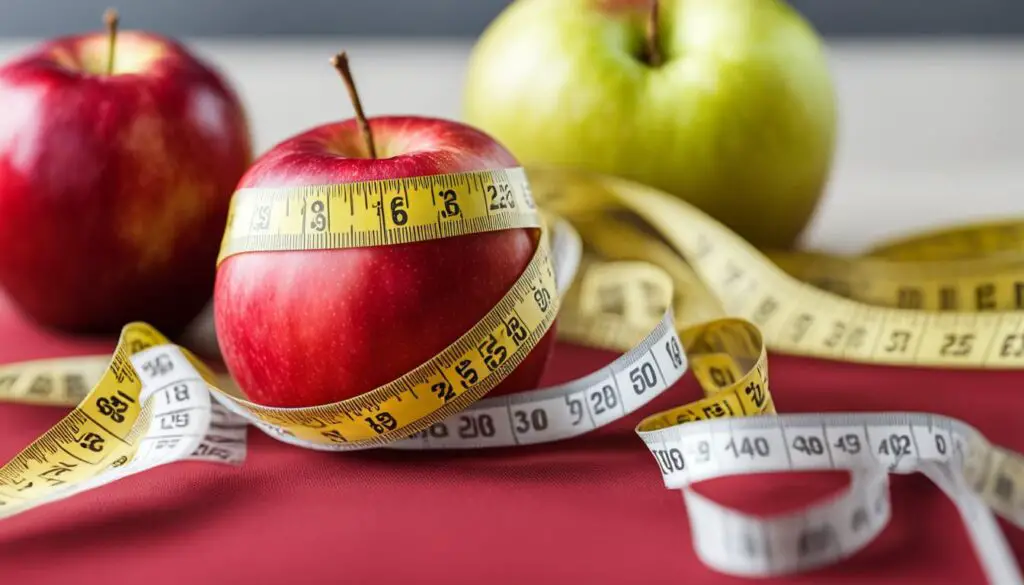
When considering the HCG diet, it is crucial to understand the safety and effectiveness of this weight loss approach. While supporters of the HCG diet claim significant weight loss and improved metabolic function, scientific evidence to support these claims is limited.
The U.S. Food and Drug Administration (FDA) has issued warnings regarding the safety of HCG products and fraudulent weight-loss claims associated with them. It is important to consult with a healthcare provider before embarking on the HCG diet or any other weight loss plan to assess potential risks and ensure it aligns with your individual health needs.
The controversy surrounding the HCG diet stems from the fact that scientific studies have not provided consistent evidence to support its efficacy. While the hormone itself, human chorionic gonadotropin (HCG), is naturally produced during pregnancy and has functions related to metabolism, its role in weight loss is not yet fully understood.
“Scientific evidence supporting the effectiveness of the HCG diet is limited, and the FDA has warned about the safety and fraudulent claims of HCG products.”
It is worth noting that the FDA has not approved the use of HCG hormone injections or supplements for weight loss, as they are considered illegal. The agency cautions against relying solely on HCG products for weight loss and encourages individuals to pursue safe and scientifically supported weight loss methods.
In light of the controversies and potential risks associated with the HCG diet, it is vital to approach any weight loss plan with caution and prioritize the guidance of healthcare professionals. They can provide the necessary support, guidance, and recommendations based on your unique health needs and goals.
The Risks and Drawbacks of the HCG Diet

The HCG diet comes with its fair share of risks and drawbacks that must be considered before embarking on this weight loss journey. One of the main concerns is the extreme calorie restriction involved in the diet. With a daily intake of only 500 calories, individuals can experience hunger, fatigue, dizziness, and a lack of energy.
Furthermore, such an extreme calorie deficit can lead to nutrient deficiencies. The limited food choices and low calorie intake may not provide the necessary vitamins, minerals, and macronutrients required for optimal health. This can result in weakened immunity, decreased muscle mass, and poor overall well-being.
Another significant concern is the use of HCG hormone injections or supplements for weight loss. It’s important to note that the FDA does not approve the use of HCG for weight loss, and it is considered illegal. The safety and effectiveness of using HCG in this manner are still subjects of debate among healthcare professionals.
Moreover, the long-term sustainability of the HCG diet is questionable. While it may lead to rapid weight loss in the short term, it may not promote lasting lifestyle changes necessary for weight management. This can lead to weight regain once the diet is discontinued.
It’s crucial to weigh the risks and drawbacks of the HCG diet against the potential benefits and consult with a healthcare professional before considering this weight loss approach. Assessing individual health conditions, lifestyle factors, and personal goals is essential in making an informed decision about any diet plan.
| Risks | Drawbacks |
|---|---|
| Extreme calorie restriction | Nutrient deficiencies |
| Use of HCG hormone injections or supplements | Not FDA-approved or legal |
| Lack of long-term sustainability | Potential for weight regain |
Alternatives to the HCG Diet

If you’re seeking safe and effective weight loss plans that are suitable for families, there are several alternatives to the HCG diet. These alternatives focus on promoting overall well-being, incorporating nutrient-dense foods, and establishing sustainable lifestyle habits. By following these alternatives, families can achieve long-term success in weight management without the potential risks and controversies associated with the HCG diet.
Balanced Meal Plans
One alternative to the HCG diet is to follow balanced meal plans that provide a variety of nutrients while maintaining a calorie deficit. These meal plans focus on incorporating lean proteins, whole grains, fruits, vegetables, and healthy fats in appropriate portions. By creating meals that are both nutritious and satisfying, families can achieve weight loss goals while promoting overall health.
Regular Physical Activity
Regular physical activity is another essential aspect of safe and effective weight loss plans. Engaging in activities such as cardiovascular exercises, strength training, and flexibility exercises not only aids in burning calories but also contributes to improved physical fitness. Families can participate in activities together, such as walking, cycling, or playing sports, to make exercise more enjoyable and create a supportive environment.
Behavior Modification Strategies
Behavior modification strategies play a crucial role in long-term weight management. These strategies focus on identifying and changing unhealthy eating patterns and behaviors. This may include mindful eating, portion control, stress management techniques, and keeping a food journal. By addressing the root causes of overeating or emotional eating, families can develop healthy habits and maintain their weight loss journey.
Support from Healthcare Professionals or Registered Dietitians
Seeking support from healthcare professionals or registered dietitians can significantly contribute to the success of weight loss plans for families. These professionals can provide personalized guidance, create tailored meal plans, and monitor progress to ensure safe and sustainable weight loss. With their expertise and support, families can navigate any challenges or barriers they may encounter during their weight loss journey.
When choosing alternatives to the HCG diet, it is essential to prioritize the overall well-being of the family. By adopting balanced meal plans, engaging in regular physical activity, implementing behavior modification strategies, and seeking professional support, families can achieve their weight loss goals in a safe and sustainable manner.
| Alternatives | Key Features |
|---|---|
| Balanced Meal Plans | Incorporates a variety of nutrient-dense foods in appropriate portions to support weight loss and overall health. |
| Regular Physical Activity | Engages in exercises that burn calories, improve physical fitness, and create a supportive environment for families. |
| Behavior Modification Strategies | Addresses unhealthy eating patterns and behaviors through techniques such as mindful eating and stress management. |
| Support from Healthcare Professionals or Registered Dietitians | Provides personalized guidance, tailored meal plans, and ongoing monitoring to ensure safe and sustainable weight loss. |
Tips for Family-Focused Meal Planning
Family-focused meal planning is essential for promoting healthy eating habits and maintaining a balanced diet for the whole family. By incorporating a variety of foods to meet everyone’s nutritional needs, planning meals in advance, and considering budget-wise options, families can enjoy nutritious meals together. Here are some tips for successful family meal planning:
- Involve everyone in meal preparation: Get the whole family involved in planning and preparing meals. This not only fosters a sense of togetherness but also allows everyone to have a say in the menu.
- Incorporate a variety of foods: Ensure that your family’s meals include a balance of lean proteins, whole grains, fruits, and vegetables. Aim for a colorful plate to provide a range of essential nutrients.
- Plan meals in advance: Take some time each week to plan out your family’s meals. This helps save time, reduces stress, and ensures that you have all the necessary ingredients on hand.
- Consider budget-wise options: Eating healthily doesn’t have to break the bank. Look for sales, buy in bulk, and choose affordable ingredients to create budget-friendly meals for your family.
By prioritizing nutritious meals and creating a positive food environment, families can develop healthy eating habits that promote overall well-being. Family meal times become opportunities for bonding, sharing stories, and enjoying delicious, homemade meals together.
Conclusion
In conclusion, the HCG diet offers the potential for family-friendly meal plans that align with the diet’s guidelines. By proper meal planning and support, families can create nutritious and budget-wise options suitable for their busy households. However, it is important to be aware of the controversies and potential risks associated with the HCG diet.
Consulting with healthcare professionals and considering safe and effective alternatives for weight loss is crucial. Prioritizing overall well-being and establishing sustainable lifestyle habits are key factors in achieving long-term health and weight management goals.
While the HCG diet can be adapted to meet the needs of families, it is essential to make informed decisions and prioritize the safety and health of every family member. By taking a well-rounded approach to nutrition and considering the guidance of healthcare professionals, families can navigate the challenges of the HCG diet and work towards a healthier future.
FAQ
What is the HCG diet?
The HCG diet is a weight loss plan that combines the use of HCG hormone injections or supplements with an extremely low-calorie diet.
What is HCG?
HCG, or human chorionic gonadotropin, is a hormone produced at high levels during pregnancy and is believed to help suppress appetite and promote fat burning.
What are the three phases of the HCG diet?
The three phases of the HCG diet are the loading phase, the weight loss phase, and the maintenance phase.
How can I maintain the HCG diet for my family?
Maintaining the HCG diet for families requires proper meal planning and support.
How can I create HCG-friendly meal plans for my family?
Creating HCG-friendly meal plans for families involves incorporating lean proteins, non-starchy vegetables, and limited fruits, while avoiding high-fat foods and added sugars.
Can you provide sample HCG diet meal plans for families?
Yes, here are some sample HCG diet meal plans for the different phases of the diet.
Is the HCG diet safe and effective?
The safety and effectiveness of the HCG diet are subjects of debate, but it is important to consult with a healthcare provider before starting any weight loss plan.
What are the risks and drawbacks of the HCG diet?
The HCG diet is associated with risks such as hunger, fatigue, dizziness, and nutrient deficiencies. The use of HCG hormone injections or supplements for weight loss is also not approved by the FDA.
What are the alternatives to the HCG diet?
There are safe and effective alternatives to the HCG diet, such as balanced meal plans, regular physical activity, behavior modification strategies, and support from healthcare professionals or registered dietitians.
What are some tips for family-focused meal planning?
Tips for family-focused meal planning include involving everyone in meal preparation, incorporating a variety of foods, planning meals in advance, and considering budget-wise options.


